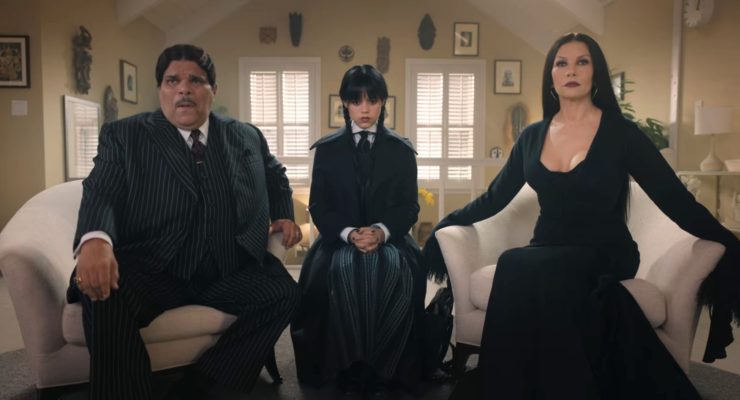It’s hard watching what’s become of the Addams Family of late. And I don’t say this a person who wants to stomp all over anyone’s current enjoyment of the current oeuvre because who needs that? It’s just uniquely painful in a way I wasn’t expecting, and that feels… a little silly. But true, nevertheless.
The Wednesday discourse has been wild if you take the time to browse, and I suppose that’s hardly surprising given that it beat out Stranger Things as Netflix’s most-watched English-language series in its first week. There have been warnings about how this might make television significantly more boring going forward (a fear I share), clapbacks that we should all remember to enjoy things (don’t know why everyone assumes that we forget), discussions of how poorly the Black characters on the show have been handled (Tim Burton is terrible at even pretending to pay attention to representation), and a revival in goth club dancing (I truly love to see it). As far as the show is concerned, it’s… fine. Some good bits, some bad bits, and Jenna Ortega is carrying the titular role like a hall of fame champion.
But there’s a very specific reason why I haven’t much liked the show overall: Wednesday is fighting with her mother.
This is by no means a new issue in Addams-inspired storytelling ventures of late. The animated film series that began in 2019 showed the Addams clan holed up in their infamous gothic house (a former asylum) on a hill in order to prevent their own persecution. When Wednesday makes friends with a relatively normal girl named Parker from town, the family is mortified at her acceptance of color and balloons. Pugsley is training to undergo a family right of passage called the Sabre Mazurka—and fails it because Gomez doesn’t give his son enough room to be himself. The second film sees Gomez and Morticia forcing a road trip on their family because they’re concerned about their children growing apart from them. They are pursued by a lawyer who tells them that Wednesday may have been swapped at birth and subsequently not their biological child. This anxiety runs under the entirely of the sequel until it is eventually disproven.
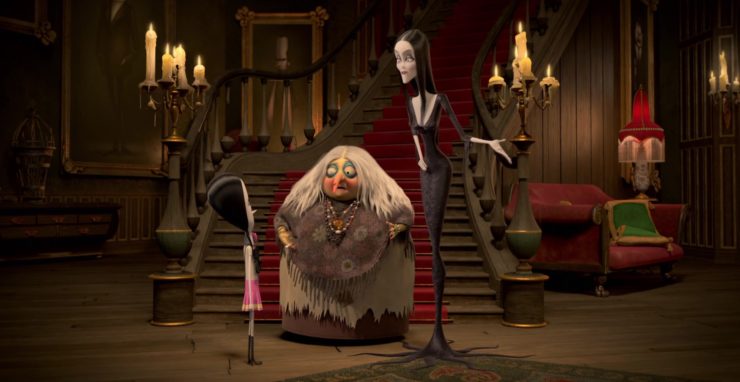
Now Wednesday has gone a thematically similar route, with the Addams daughter getting sent to the boarding school that her parents attended after she is kicked out of several public schools for various forms of malevolent (and completely understandable) behavior. While Nevermore Academy is a place meant for outcasts and proves to be a better fit than she had hoped, Wednesday is aggravated by her parents choice to send her and with her mother’s hand in it specifically—she believes that Morticia wants them to be exactly alike, and is disgusted by this.
Unhelpfully, Wednesday is immediately assigned to her mother’s old dorm, Ophelia House, and replies to this, staring at her parents: “Ophelia’s the one who kills herself after being driven mad by her family… correct?”
Things further complicate themselves as Principal Weems (her mother’s old roommate) attentively points out all the ways Wednesday is similar to Morticia, Wednesday learns of a murder that her father was accused of while at the school, and a family therapy session leads to a reopening of the case that eventually sees Wednesday digging up a body with her dear mother. It’s all entertainment carved toward the purpose of solving the season’s core mystery, which is largely concerned with an Addams ancestor, awful pilgrims, and Nevermore Academy’s history, but it doesn’t change a strange pattern that seems to be emerging—
—all the latest Addams Family narratives prioritize familial strife.
This is particularly distressing as someone who grew up on the ‘90s films, but should put a sour taste in the mouth of any fan of the Addams clan. Their conception as a series of comics by Charles Addams showed a macabre family that supported each other’s hobbies and fascinations, largely led by Morticia. The sitcom from the ’60s didn’t stray far from that brief, particularly in its depiction of Gomez and Morticia’s passion for one another. Constant in-fights, petty bickering, and generational family divides were never the drive of these stories so much as a full embrace of an outlook and aesthetic that “normal” people might consider dour or even frightening. It wasn’t just that the Addamses preferred gothic, grotesque, or disturbing things—we were meant to note the joy they took in them.
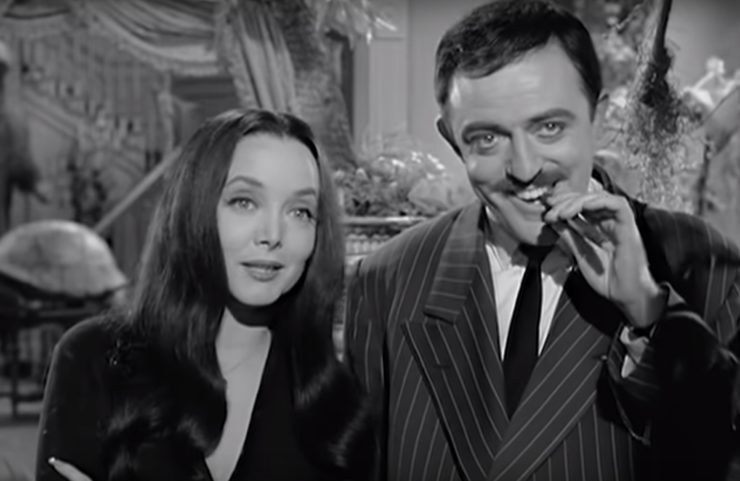
That joy has always been a central factor of the family’s appeal, even when displayed in a more muted fashion (as Wednesday is wont to do). Rather than playing up the supposed “antisocial” aspects of the macabre, the Addams family was united in their enthusiasm and never avoidant of the world outside. It’s hardly a wonder that the sitcom ran during years when counterculture was thriving in the United States—the Addams family spoke to a rejection of “normalcy” at its most fundamental level, and often used satire to power its comedy. It was an alternative to the mundane expectations of the world.
Having noted all this history, it is hard to replace the ‘90s films as the zenith of their formula. There are many factors to the success of The Addams Family and Addams Family Values—a truly stunning cast, embrace of camp, sharp and deceptively compact storytelling—but that neglects perhaps its greatest strength as an all-too-short film series:
The Addams Family films were about family being a haven of pure acceptance and unquestioning love.
That’s it. That’s the secret sauce in one ingredient. And it sounds simple perhaps, or maybe even obvious, but I would like to call attention to the sheer dearth of stories that match it. Because as a kid growing up the the early ‘90s, the usual formula was equally simple and entirely ubiquitous: Here’s the family! Mom and dad mostly deride and misunderstand each other because opposite genders, amirite? When they’re not busy sniping and undercutting one another, they have to deal with their children, who can’t stand them, because the only consistent rule of having children is being disappointed about every way in which they are not like their parents/conforming to the life their parents saw for them, and the rebellion that this triggers in them. Hilarious!
For a lot of kids, the Addams Family was the first and possibly only example that they ever found of a functional family. It was a monochromatic oasis of devotion, support, and casual homicide ideation. The parents were visibly in love and entirely in sync. The siblings were bent on mutilation not because they loathed each other, but because it was fun. And where every point of potential friction was centered on Fester Addams being taken advantage of, the response of the family was always unflinching succor and concern for his well-being.
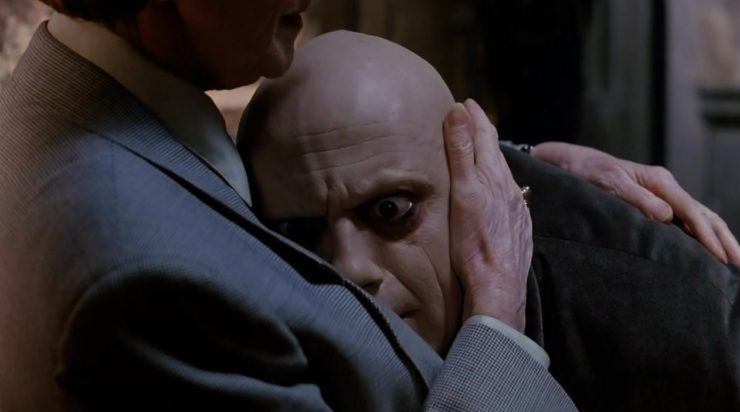
This is particularly important because in both instances, and in both films, Fester is subject to abuse. That might sound like an overstatement when referring to a set of family comedies, but is nevertheless true. The first film shows an amnesiac Fester beholden to a con woman named Abigail Craven, who has convinced Fester that he is her own son named Gordon. While trying to swindle the Addams’ out of their fortune by pretending that Gordon is the long-lost Fester Addams (not knowing that this is actually the case), Craven regularly berates Gordon for his ineptitude and every moment that he actually enjoys himself with the Addams crew. She pretends to be deeply hurt when he shows genuine affection for these “strangers,” holding her own kindness hostage unless Gordon does her bidding.
In the meantime, Gomez’s confusion over Fester’s strange behavior is something that he works out in a therapy session with Craven (under her guise as Dr. Pinder-Schloss), coming to the realization that feeling antagonistic toward his brother is a perfectly normal—and pleasurable—state to be in. In effect, the family comes so close to fully absorbing Fester back into their fold that Craven resorts to physical abuse, striking him and then blaming the Addams’ for her outburst. When Craven’s plan comes to fruition and the Addamses are kicked out of their home, the family does not rush to lambast Fester for their plight—instead they are desperately trying to figure out what they have done wrong to warrant such treatment, triggering an acute depression spiral in Gomez.
In the second film, Fester is seduced by a woman who turns out to be a black widow serial killer named Debbie Jellinsky who is out for his money. Beginning as the family nanny, when Debbie finds that Wednesday is onto her scheme, she convinces Gomez and Morticia that Pugsley and Wednesday secretly want to go to summer camp. The camp is a startlingly normal place, but the Addams parents never question the children’s desire to attend—Debbie has assured them that this is what they want, and they have no intention of making their children feel awkward for it.
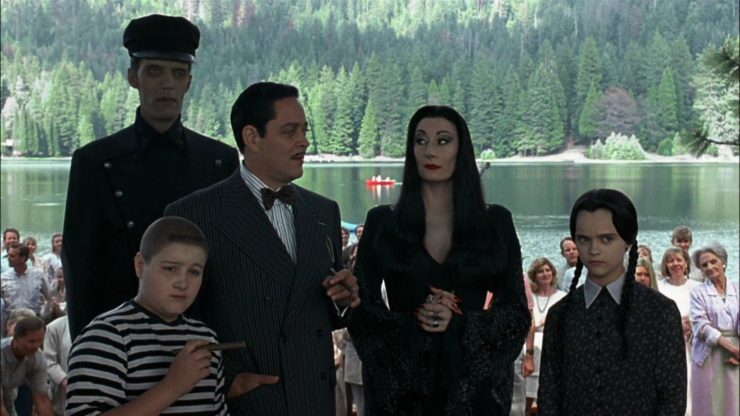
Later, once Debbie marries Fester and forces him to cut ties with his family, we find them confused again as to what they’ve done, but they still make an effort to reconnect and understand why they are being driven from Fester’s life. This strain results in the transformation of the Addams’ infant son Pubert, remaking him into a blond-haired blue-eyed cherubic baby. While the family is deeply disturbed by this sudden change, they continue to give their son the same care he received before. (At one point we find Morticia reading The Cat in the Hat to the child, and woefully asking “…Are you enjoying this?”) Of course, that endless well of familial love wins out and they get Fester back—and after offering a fair amount of empathy to Debbie, too, for her own plight as a serial killer.
It’s the lack of judgment that stands out all the way through: the family is dismayed when Fester seems to break from them, but they never blame him for what’s happened or hold it against him in the aftermath. They don’t want any of their children to wind up as orthodontists or accountants, but if one of them did, it’s clear that they would be supported in their endeavors regardless. Morticia and Gomez lead their family by example and correct behavior oh-so-gently (think of when Morticia takes Wednesday’s carving knife and replaces it with a long-handled cleaver). Time spent together is both enriching and fun—from games of “Wake the Dead” to large soirees with the entire family present for dancing and music to looking through books about wounds with your uncle so that you can create props for a bloody talent show sword fight. Mental health struggles are something to be weathered together, not a reason for dissolution and cruelty. And the family as a whole serves as a refuge for the odd and unappreciated; when the family’s accountant Tully Alford is neglectful and dismissive of his wife, she winds up leaving him… for Cousin Itt.
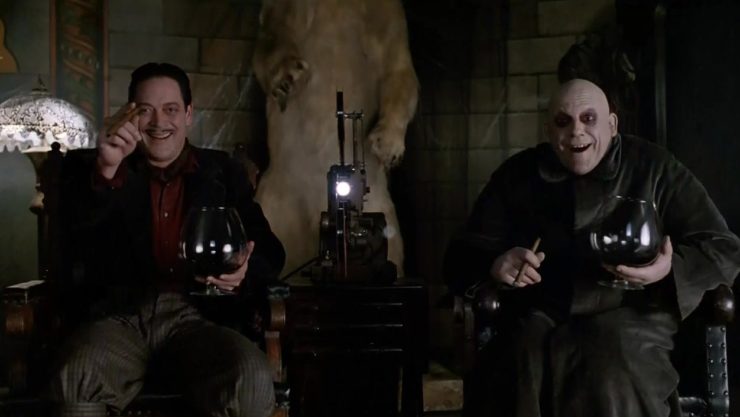
And of course, the most important room in the family vault contains nothing more than mementos, photo albums, and home movies because that is what the Addams’ truly value—each other.
There’s a reason why people still make memes and Tumblr posts that suggest you should never take anything less than Addams-esque behavior from the people who purport to love you. For many of us, they were the first example (in fiction or reality) of a family that treated one another with dignity, affection, and true loyalty. It made them singular, and that makes it much harder to watch the current iterations. The image has been distorted. The discord feels pedestrian. The zeal for grim and gruesome life has been sucked right out.
So Wednesday is proving popular, and I wish her all the best… but it still seems a shame that everyone writing the Addams Family these days has neglected what used to make them creepy, kooky, mysterious, and damned inspiring. Until we get that version again, I’ll always be looking wistfully backward.
Emmet Asher-Perrin definitely modeled their idea of romance off Gomez and Morticia, and that worked out shockingly well for them in the longrun. You can bug them on Twitter and Tumblr, and read more of their work here and elsewhere.










